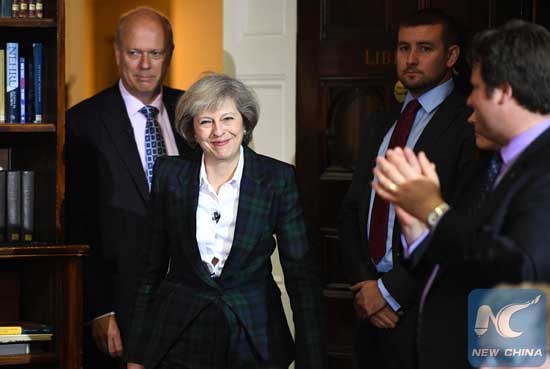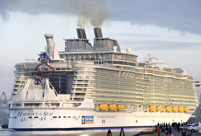


Home Secretary Theresa May launches her leadership campaign in London, Britain, June 30, 2016. Five contenders emerged Thursday in the race to become the next prime minister of Britain following David Cameron's decision to quit. (Xinhua)
LONDON, July 5 (Xinhua) -- British Home Secretary Theresa May remained frontrunner to replace Prime Minister David Cameron Tuesday as one of the five Conservative leadership contenders dropped out of the race and another withdrew hours later.
In a ballot of Conservative members of the Parliament (MPs), ex-Defense Secretary Liam Fox notched up the lowest number of votes, 16, compared to May who won the backing of 165 MPs. He was immediately eliminated from the leadership race.
Just two hours after a vote by Conservative MPs at Westminster had finished, the man who came fourth, Work and Pensions Secretary Stephen Crabb, who won 34 votes, announced he was withdrawing, and backing May.
Of the 330 Conservative MPs in the House of Commons, all voted apart from the Prime Minister whose resignation after the EU referendum triggered the contest.
The result makes it almost certain that May, a Remain supporter in the referendum process, will be one of the two candidates to go forward to the final stage when thousands of party members across the country decide who they want at 10 Downing Street.
Pro-leave Andrea Leadsom, the energy and climate change minister, came second in Tuesday's ballot, with 66 votes, followed by Justice Secretary Michael Gove, who won 48 votes.
A second ballot Thursday will decide which two of the three will go to a national ballot of all Conservative Party members.
May is virtually guaranteed a place, meaning Thursday vote will effectively decide whether her challenger will be Leadsom or Gove.
Gove has faced criticism from many within the party for treachery after he decided to stand, knowing that former mayor of London Boris Johnson had already set his sights on moving to 10 Downing Street.
The two men were both in the forefront of the leave campaign. Gove faces being punished by some MPs for the way he allegedly "stabbed Boris in the back." Gove had justified his last minute decision to stand by insisting Johnson was not up to the job of being PM.
Johnson shocked the country with a speech saying he would not stand in the leadership contest.
The result of the ballot of the final two candidates will be announced early in September.
While MPs were busy at Westminster trying to pick the next prime minister, behind-closed-doors talks were taking place over the civil war in the main opposition Labour camp.
Tough-talking union leader Len McCluskey from Liverpool, was attempting to broker a peace between estranged party leader Jeremy Corbyn and the vast majority of his own MPs who have disowned him.
McCluskey, from Britain's biggest union Unite, held separate talks with Corbyn as well as the party's deputy leader Tom Watson.
Buoyed by massive grass-roots support, Corbyn has steadfastly refused to resign, and is likely to face a challenge to the leadership within the next few days if he insists on hanging on.
And while the politicians were busy with their woes at Westminster, the governor of the Bank of England fired off a missile that sent the value of British pound spiral, again, to its lowest level against the U.S. dollar for over 30 years.
Mark Carney delivered a message to reassure the city that measures were being taken to minimize the impact of the Brexit vote.
But most of the commentaries zoomed into the negative parts of his speech, "evidence that some risks of a leave vote have begun to crystallize" and "the current outlook for UK financial stability is challenging," Carney said in his speech.
The headline announcement had been that the Bank of England on Tuesday took steps to ensure British banks can keep lending in the Brexit aftermath. Carney said the bank would lower the amount of capital banks are required to hold in reserve, freeing up an extra 195 billion U.S. dollars for lending.
The political warring may take a back seat Wednesday when MPs study the long awaited Chilcot Report into Britain's involvement in the Iraq War of 2003.
 Five made-in-China hi-tech breakthroughs
Five made-in-China hi-tech breakthroughs Beijing Style: Hot pants
Beijing Style: Hot pants HK-Zhuhai-Macao Bridge to open to traffic
HK-Zhuhai-Macao Bridge to open to traffic China opens its first combined transport service to Nepal
China opens its first combined transport service to Nepal Students take stylish bikini graduations photos
Students take stylish bikini graduations photos Charming dancing students pose for graduation photos
Charming dancing students pose for graduation photos Guizhou, Yunnan section of Shanghai-Kunming railway connected
Guizhou, Yunnan section of Shanghai-Kunming railway connected Naked models transformed into landscapes, birds and even DRAGONS by body painting artist
Naked models transformed into landscapes, birds and even DRAGONS by body painting artist World’s biggest cruise ship Harmony of the Seas to start maiden voyage
World’s biggest cruise ship Harmony of the Seas to start maiden voyage Top 20 hottest women in the world in 2014
Top 20 hottest women in the world in 2014 Top 10 hardest languages to learn
Top 10 hardest languages to learn 10 Chinese female stars with most beautiful faces
10 Chinese female stars with most beautiful faces China’s Top 10 Unique Bridges, Highways and Roads
China’s Top 10 Unique Bridges, Highways and Roads Power game decides post-arbitration order
Power game decides post-arbitration order Xinjiang’s millennial entrepreneurs make the most of the Internet age
Xinjiang’s millennial entrepreneurs make the most of the Internet age Motivated official sweeps away his village’s narcotics problem
Motivated official sweeps away his village’s narcotics problem Regulators quashing deals for star-founded companies due to sky-high valuations
Regulators quashing deals for star-founded companies due to sky-high valuationsDay|Week